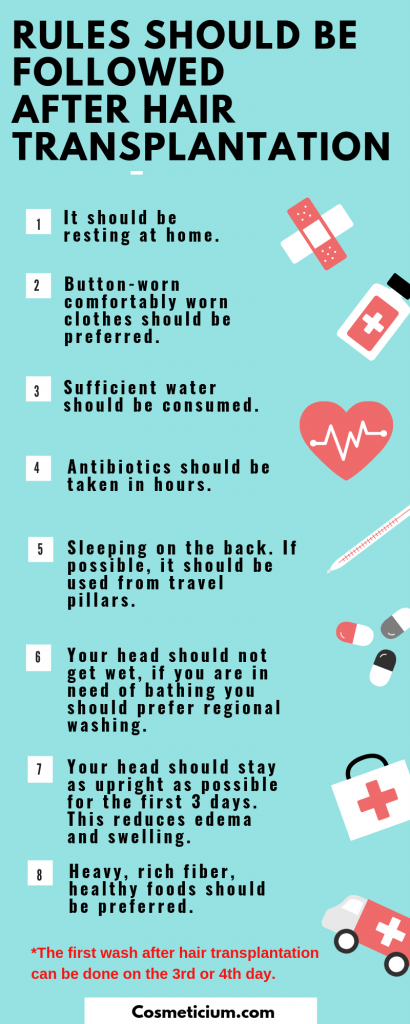Swelling on the scalp, forehead and eye area may occur due to the methods used for hair transplantation. Swelling after hair transplantation is completely normal. There are different reasons for the formation of this swelling, but it should be noted that this is a result of hair transplantation. More precisely, swelling after hair transplantation is seen in almost every patient, and as we say, it is extremely normal. After hair transplantation, the swelling starts immediately after hair transplantation and may be seen at different points in each patient. With some precautions to be taken, the swelling may be lighter and less time will be needed for recovery.
What are the causes of swelling after hair transplantation? When and how do these swellings recover? All the details are in our article.
Table of Contents
The Main Causes of Swelling after Hair Transplantation
There are different reasons for the swelling that occurs after hair transplantation. But some of them have come to the fore. The reasons and their explanations are as follows:
Serum
For hair transplantation, there should be some space in the area to be operated. Thanks to this gap, the hair follicles can be transplanted more comfortably in the region and the chance of the transplanted hair to be healthy is higher. Therefore, after anesthesia is applied to the scalp, serum is injected here. The serum injected creates a space between the skin and the skull. Once the hair transplantation is completed, this serum cannot be removed from the body immediately and will result in edema. There may be some swelling on the scalp depending on the serum and edema.
Initially, the swelling on the scalp due to the serum will change when the patient gets out of the bed and wander around. Here, the serum goes down the scalp and reaches the eyes due to the effect of gravity. Therefore, in the first days after hair transplantation, patients are asked by specialist physicians not to bend their heads forward. In patients who do not pay attention to this warning, swelling may reach up to the temples after hair transplantation. The swelling stops after sufficient tension is reached.
Different amounts of serum are given according to the area to be transplanted and the size of the person’s head. Therefore, not everyone has an equal swelling. As the amount of serum used for hair transplantation increases, the swelling seen will be more.
You May Also Like: Why Does Itching Occur After Hair Transplantation?
Hair Transplantation
One of the causes of swelling after hair transplantation is the hair transplantation itself. Small holes should be opened in the scalp during hair transplantation. Although the procedure seems simple, it is a surgical operation. The large numbers of holes created in the scalp are wounds to the body, and the body works hard for their rapid healing. Consequently, both the impacts received and the body’s desire to repair itself concentrate on this area, causing a certain amount of swelling here.
Anesthesia
Drugs that are administered directly to the scalp for anesthesia can cause swelling after hair transplantation. Different levels of swelling will occur depending on the amount of the drugs used. In addition, allergic conditions against the agents in the drugs used for anesthesia and edema caused by these drugs may result in swelling.
When the above-mentioned causes are examined carefully, it will be seen that the main cause of swelling is serum. The effects of other similar causes result in a more limited swelling.
You May Also Like: Procedures to Be Performed at the Clinic After Hair Transplantation

Where is Swelling Seen After Hair Transplantation?
The area where swelling after hair transplantation may be seen is primarily the scalp. The accumulation of fluid in this area starts to move from the places where they exit to the other parts of the body as people get up and move their heads. The fluid under the skin cannot be directly ejaculated. This problem and the effect of gravity cause downward movement of the fluid, which causes swelling to occur on the face, eye, forehead and neck. But it should be noted that these are extremely natural and temporary.
When Does Swelling Pass After Hair Transplantation?
The swelling after hair transplantation cannot be completely prevented despite some precautions. It should be known that there will be a decrease in the quality of hair transplantation when it is completely prevented.
Since swelling is a natural result after hair transplantation and cannot be prevented completely, the question of when swelling passes after hair transplantation is asked. It can be said that the answer to this question is not the same for everyone. When the swelling will go away is different for everyone in terms of the degree of swelling, how strictly the warnings after hair transplantation are taken into account and other similar situations. However, it is generally expected that the swelling will pass within 3 to 5 days after the operation.
If the swelling has not disappeared or decreased during this period and if there are symptoms such as pain and high fever on the scalp, it is necessary to go to the hair transplantation clinic without delay.
You May Also Like: What Kind of Care Should Be Done After Hair Transplantation?
How Does Swelling Go Away After Hair Transplantation?
There are a number of measures to be taken for the swelling that occurs after hair transplantation to pass faster. Thanks to these, the period of swelling can be overcome more smoothly and faster. These measures and other actions to be taken can be listed as follows:
- You should rest in bed and avoid standing up and for 5 days after having hair transplantation.
- Bending the head as rarely as possible in the first days will result in less swelling.
- Spicy and salty foods should be avoided after the process.
- Increasing fluid consumption during this period is very important. Edema, which causes swelling, will be excreted more rapidly with urine due to increased fluid consumption.
- Avoid strenuous sports, sexual intercourse and similar activities for 1 week.
- If medications that are prescribed for edema by a doctor after the procedure, they should be used regularly.
- Cold press can be applied to the swelling areas after hair transplantation. However, this process should not be done to the treated areas. Because the application of ice can adversely affect the newly transplanted hair follicles. In other regions, it reduces the blood flow rate, resulting in less swelling.
- Do not lie directly while resting in bed after the operation. During this period, you should lie at an angle of 45 degrees. This allows the ejaculation of the edama and also prevents damage to the hair follicles. You can get the necessary details from our article on how to sleep after hair transplantation.
- Care should be taken not to use drugs such as ibuprofen and aspirin in the first 5-6 days after hair transplantation. Because these drugs dilute the blood and thus increase the blood flow rate. This results in edema.
- It is known that in addition to these precautions, some clinics advise the patient to wear a headband. In this way, it is stated that the edema is prevented from going down to the facial area. However, some clinics state that this affects the blood flow negatively which results in negative effects on the newly transplanted hair follicles. Therefore, the process referred to herein is not considered to be one of the general truths.
These are the main points you need to know about swelling after hair transplantation. It is completely natural and temporary. Swelling after hair transplantation is a natural result of hair transplantation.

